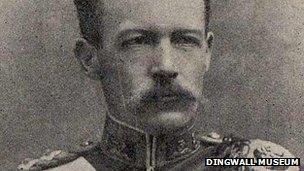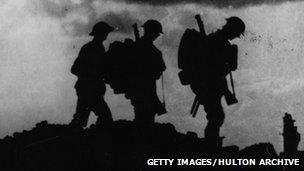The officer and gentleman behind Inverness park
- Published

Col Warrand wanted his estate to be made available to the people of Inverness
A BBC Scotland investigation of proposed routes for a new bypass for Inverness has revealed a potential hidden cost to the project.
Land Highland Council believes it has free use of could actually belong to the Inverness Common Good Fund, according to the title deeds.
Here BBC Scotland looks at the history of the area involved.
Only one of the eight options being investigated by the Highland Council avoids crossing popular green spaces in the Whin Park area.
This high-level bridge further upstream at Torvean Quarry would cross both the River Ness and Caledonian Canal in one go, but the route would cost about £68m - more than double the price of the cheaper options.
The park lands that could be crossed by the other options for the road were laid out after Inverness Town Council bought the Bught Estate in 1923.
The previous owner was Col Alexander Redmond Bewley Warrand of the Seaforth Highlanders, whose main residence was Ryefield House near Conon Bridge, in Ross-shire.
From a family with a long military tradition, Col Warrand graduated from the Royal Military Academy, Sandhurst in 1881.
'Exceedingly popular'
Within a year he was in action in Egypt, leading soldiers at Tel el-Kebir, a battle commemorated by the monument at Station Square in Inverness.
He retired from the Army in 1911 but at the outbreak of World War I he become the lead recruitment officer for northern Scotland.
In 1922 Col Warrand, who had never married and had no children, offered to sell his Bught Estate to the people of Inverness for £12,500, a price considered to be below market value.

Col Warrand became a recruiting officer during World War I
According to a report in the Inverness Courier, a letter was read out from the colonel at a council meeting that said he would prefer it if the estate was bought for Inverness.
The idea was that much of the area would be laid out as recreational park land and perhaps Col Warrand considered that after all the suffering during the war he was doing his bit to create a land fit for heroes.
When he died a few years later his obituary in the Inverness Courier described him as a man with "a keen interest in local affairs and everything pertaining to the welfare of the Highlands".
The early 1920s were a time of austerity and local councillors hummed and hawed for a year about whether to use the limited public money available to purchase the estate.
After much debate the council eventually decide to put in an offer of £8,000 - £4,500 below the asking price - which was described as "ridiculous" by Col Warrand's solicitors.
However, pressure was growing for the council to buy the estate. One councillor was quoted saying that "future generations might blame them if they did not".
Members of the public were raising money towards the purchase through a Citizens Guarantee Fund.
New controversy
The Inverness Courier accused the council of behaving badly towards Col Warrand, who was described in his obituary as "exceedingly popular in the district".
In a leader column the newspaper said that Col Warrand had "treated the council with great courtesy and shown himself ready and anxious to meet them, as far as is possible, in the matter of price".
In May 1923 a deal was finally reached and the Bught Estate became the common good land of the people of Inverness for a sum of £11,250.
The purchase of the Bught had a profound affect on the development of Inverness and ensured that large amounts of green space survived being swallowed up by new housing schemes while the town grew into what is now a city.
Today the area contains the Inverness Leisure Centre with its gyms and swimming pools, the Bught sports pitches, the Inverness Ice Centre, the Floral Hall and the new Highland Archive Centre.
The colonel's former estate lands at Whin Park and Canal Park, however, are now caught up in a new controversy.
- Published29 November 2011
- Published24 November 2011
- Published23 November 2011
- Published21 October 2011
- Published11 February 2011
- Published3 February 2011